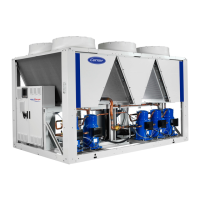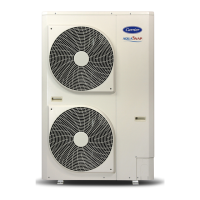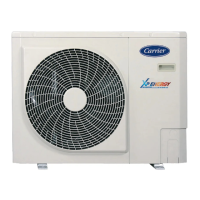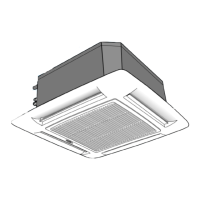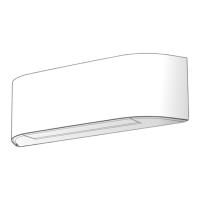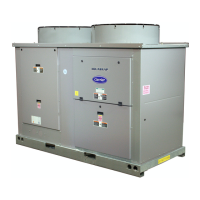45
NOTES: Monitoring during operation, re-qualication,
re-testing and re-testing dispensation:
• Follow the regulations on monitoring pressurised
equipment.
• It is normally required that the user or operator sets
up and maintains a monitoring and maintenance le.
• If there are no regulations or to complement them follow
the control programmes of EN 378.
• If they exist follow local professional recommendations.
• Regularly inspect the condition of the coating (paint)
to detect blistering resulting from corrosion. To do this,
check a non-insulated section of the container or the
rust formation at the insulation joints.
• Regularly check for possible presence of impurities (e.g.
silicon grains) in the heat exchange uids. These
impurities maybe the cause of the wear or corrosion by
puncture.
• Filter the heat exchange uid check and carry out
internal inspections as described in EN 378, annex C.
• In case of re-testing take the possible maximum pressure
difference of 25 bar into consideration.
• The reports of periodical checks by the user or operator
must be included in the supervision and maintenance
le.
Repair
Any repair or modication of the plate heat exchangers is
forbidden.
Only the replacement of the complete heat exchanger by an
original heat exchanger supplied by the manufacturer is
permitted. The replacement must be carried out by a qualied
technician.
• The heat exchanger replacement must be shown on the
monitoring and maintenance le.
Recycling
The plate heat exchanger is 100% recyclable. After use it
contains refrigerant vapours and oil residue.
Operating life
This unit is designed for:
• Prolonged storage of 15 years under nitrogen charge
with a temperature difference of 20 K per day.
• 900000 cycles (start-ups) with a maximum difference of
6 K between two neighbouring points in the container,
based on 12 start-ups per hour over 15 years at a usage
rate of 57%.
17.4 - Electronic expansion valve (EXV)
The EXV is equipped with a stepper motor (2625 + 160 /- 0
steps) that is controlled via the EXV board.
17.5 - Refrigerant
61WG/30WG/30WGA units operate exclusively with
R-410A.
Any modication or alteration such as soldering on the
compressor shell may invalidate the right to use the
equipment.
Units using these compressors are installed in areas where the
temperature must be between 5 °C minimum and 40 °C
maximum. The temperature around the compressors must
not exceed 50 °C during unit shutdown cycles.
Shock absorbers are installed under the compressor feet.
17.2 - Lubricant
The compressors have the following factory lubricant charge:
polyolester oil (reference: POE 160SZ). Contact Carrier to
order the oil. This lubricant must not be mixed with other
lubricant types.
Before start-up and after normal unit operation check that
the oil level is visible.
If an additional oil quantity is required to compensate the
initial low level in the compressors, top up the charge, using
only the permitted lubricant shown on the compressor name
plate: polyolester oil (ref: POE 160SZ).
NOTE: Only use oil approved for these compressors. Do
not re-use oil that has been exposed to the air.
ATTENTION: R22 oils are not compatible with R410A
oils and vice-versa.
17.3 - Evaporators and water-cooled condensers
The evaporators and condensers are single-circuit plate heat
exchangers. They are tested and stamped for a maximum
operating pressure of 4870 kPa, 2820 kPa on the refrigerant
side and 1000 kPa on the water side.
For 61WG/30WG units the heat exchanger sizing for the
whole range ensures a saturated evaporating temperature of
4.5 °C and a condensing temperature of around 38 °C with
actual subcooling of around 4 K at the condenser leaving side,
based on nominal Eurovent conditions.
The evaporators and condensers are single-circuit for all
units. The water connections between the heat exchangers and
the piping of the hydronic modules have quick-connect
Victaulic couplings to facilitate pump disassembly, if required.
A drain with a 1/4 turn valve is included in the leaving water
of all heat exchangers.
The evaporators have 19 mm thick polyurethane foam
thermal insulation. For option 86 (condenser insulation), the
condensers also have 19 mm thick polyurethane foam thermal
insulation.
The products that may be added for thermal insulation of the
containers during the water piping connection procedure
must be chemically neutral in relation to the materials and
coatings to which they are applied. This is also the case for
the products originally supplied by Carrier.
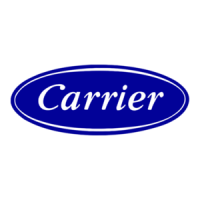
